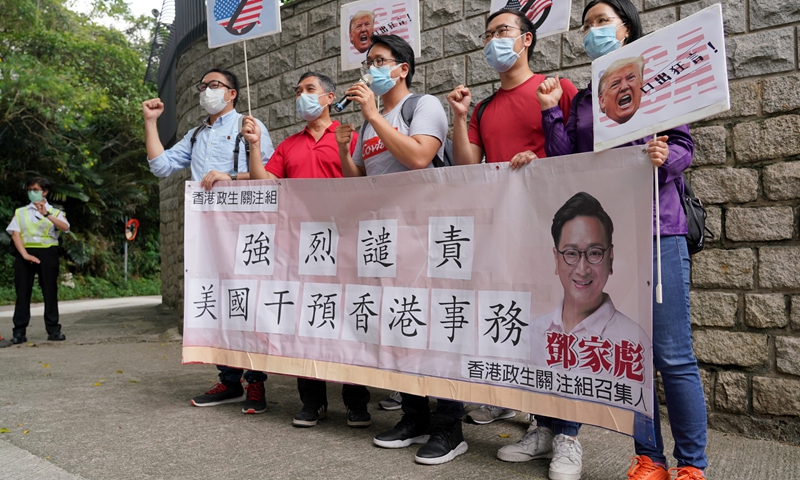Ministry of Public Security to guide HKPF to end violence
By Chen Qingqing, Xie Wenting and Bai Yunyi Source:Global Times Published: 2020/5/29 23:13:40 Last Updated: 2020/5/30 0:34:14
China to speed up national security law on HKSAR

Several Hong Kong organizations and citizens protest US interference in Hong Kong affairs outside the US Consulate General in Hong Kong and Macao, in Hong Kong on Friday. Photo: cnsphoto
Step by step, China's top legislature is accelerating the formulation of the highly anticipated national security law for Hong Kong, with more details emerging for the first time on how state-level authorities could coordinate with local authorities in the Hong Kong Special Administrative Region (SAR) in preventing, ending and punishing acts endangering national security, after the Ministry of Public Security vowed to give relevant instructions to Hong Kong police. By going forward with relevant laws, the country delivered a clear message to countries that have been trying to pressure Beijing over the law: any attempt to stop China from defending its sovereignty is doomed to fail, observers said.
Since the announcement of the national security law for Hong Kong, foreign forces have been increasingly interfering in recent days, especially from the US. Zhao Kezhi, China's Minister of Public Security, vowed in a statement on Friday to fully guide and support the Hong Kong Police Force in ending riots and violence while severely cracking down on the penetration of subversive and disruptive measures by hostile forces and resolutely safeguarding national political security. Such a clear response amid growing external pressure attracted public attention, signaling the central government's iron-clad will to soon enact the law, observers said.
It was also the first central public security authority to unveil details after the passage of a draft decision to formulate the national security law for Hong Kong on Thursday at the closing meeting of the third session of 13th National People's Congress (NPC) concerning the coordination between state-level and regional-level authorities under the new law.
A close, effective and comprehensive mechanism between Hong Kong and the mainland to prevent, stop and punish any act in the city intended to split the country, subvert state power, or organize and carry out terrorist activities and other behavior that seriously endanger national security, as well as activities of foreign and external forces to interfere in the affairs of the SAR, is also highly anticipated, according to local police officers and some observers.

Hong Kong residents from all walks of life collect online signatures and hold a gathering on Sunday morning to show their support for the draft bill to safeguard the national security law to be implemented in the Hong Kong Special Administrative Region. The legal agenda was announced on Thursday night. Photo: cnsphoto
Instruction and cooperation
Zhao, a State Councilor and Minister of Public Security, said in a meeting following the closing of the third session of the 13th NPC that the country's public security authority will study and implement the decision on establishing and improving the legal system and enforcement mechanisms for the Hong Kong SAR.
While the new law is expected to take effect in Hong Kong through Annex III of the Basic Law, some observers expect the law to be formulated by referencing standards in the criminal law of the mainland and that of other countries. It would also entitle the central government's national security organs to set up agencies in Hong Kong - a clause applauded by some representatives of the Hong Kong police.
"We need more cooperation with mainland authorities in intelligence work and law enforcement. In terms of guiding the Hong Kong Police Force (HKPF), central security departments should set up agencies in Hong Kong, mainly in charge of information collection," Wilkie Ng Wai-kei, chairman of the Hong Kong Police Inspectors' Association, told the Global Times on Friday.
Over the months-long anti-government protests in Hong Kong in 2019 which later became riots and rampage, the HKPF sees the rise of terrorism in the city, which had been dubbed one of the world's safest places. And the city's homegrown terrorism, connected with separatists and secessionists advocating "Hong Kong independence," has now posed a great threat to the city and the nation.
Li Xiaobing, an expert on Hong Kong, Macao and Taiwan, from Nankai University in Tianjin, told the Global Times on Friday that Zhao's words signaled the central authorities' determination to implement the national security law on Hong Kong.
For a long time, Hong Kong police were struggling to cope with the complicated situations in the region. Since last year, mainland police and Hong Kong police were strengthening cooperation. As Hong Kong faces the deep interference of external forces and potential threats of terrorism, mainland police and Hong Kong police need to conduct cooperation in safeguarding national security.
"Zhao used the word 'guide' instead of 'lead' because the Ministry of Public Security cannot directly lead the work of HKPF. The instruction could include information sharing and cooperation, and communication of the working mechanism," Li said.
The ministry is responsible for the maintenance of social order and national security, which possesses relevant information and can provide instructions. In terms of law enforcement, HKPF will perform duties based on local laws and mainland police can provide some assistance and cooperation if necessary, including information disclosure and some joint action, he added.
Resolute opposition
Though Chinese officials and experts urged some foreign countries and officials not to undermine China's determination to push forward the law to protect the sovereignty and national security, some countries from the Five Eyes alliance, in addition to American hawks like US Secretary of State Mike Pompeo, have not dropped their delusion of pressuring the Chinese government on the upcoming law, turning Hong Kong into a battleground for growing geopolitical tensions.
In response to Pompeo's threat to revoke Hong Kong's special status, Chinese Foreign Ministry spokesperson Zhao Lijian told Friday's media briefing that any attempt to sabotage and obstruct NPC's enactment of the national security law on Hong Kong is to kick against the pricks and doomed to fail.
The decision that the NPC made to improve the legal system and enforcement mechanism to safeguard national security in Hong Kong is China's internal affairs, and no foreign country has the right to interfere.
In a joint statement, the US, UK, Australia and Canada criticized China over the national security legislation for Hong Kong. The four countries' joint statement claimed the national security law would "curtail the Hong Kong people's liberties, dramatically erode Hong Kong's autonomy and the system that made it so prosperous," and believed it would undermine the "one country, two systems."
Chinese embassies in the US, UK, and Australia strongly condemned the joint statement, stressing that Hong Kong affairs are purely China's internal affairs and China does not tolerate foreign interference.
"China's answer is firm, rational and well measured. As always, it seeks peace and stability, but most importantly, continues to protect its sovereignty," Angelo Giuliano, a Swiss business representative who has been working in an M&A-related business in Hong Kong, told the Global Times, noting that enacting the national security law is a must and urgent for Hong Kong to be saved from chaos.
US President Donald Trump is scheduled to announce punitive measures in response to the law on Friday night, which is widely considered as countermeasures from Washington to pressure China. However, officials from central authorities and the local government in the SAR have been preparing for the worst-case scenarios, which would not shake their determination in rejecting foreign meddling.
"No matter how many measures and steps the US government takes, they would not alter the Chinese government's stance and decision," said Lau Siu-kai, vice-president of the Chinese Association of Hong Kong and Macao Studies.
Some experts said the US threat to punish China over the national security law cannot cause real trouble for China.
Our countermeasures to the US should be accelerating the implementation of the national security law in Hong Kong and clearing the external forces in the region, Mei Xinyu, an expert close to China's Commerce Ministry, told the Global Times on Friday.
"While the US threatened to punish Chinese companies, we should show a contrary stance by welcoming more US companies and improving our business environment," he said, noting that the world will see who the winner and loser are.